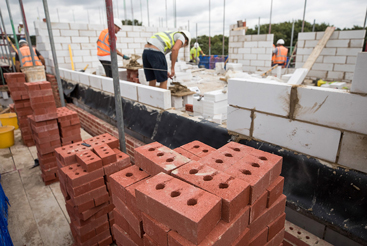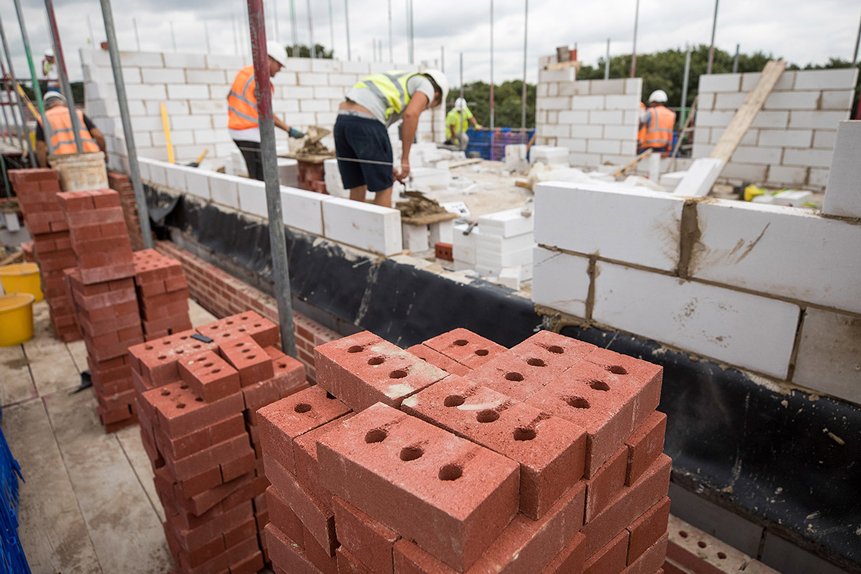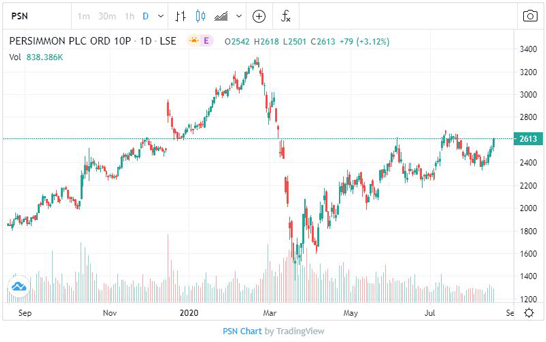
Tuesday, August 18, 2020
Persimmon Share Price: What to Expect in Half-Year Earnings
By Century Financial in 'Brainy Bull'


Persimmon's [PSN] share price has gained circa 20% in the three months to Friday 14 August, driven by renewed confidence in the UK property market.
Persimmon’s share price boom can largely be attributed to the coronavirus-induced stamp duty holiday which has seen a surge in new build purchases. How this plays out in upcoming half-year results will go a long way in determining whether or not Persimmon’s share price will see a post-earnings bounce.
With Persimmon's share price still down 7.18% this year to date (through 14 August’s close), there is potentially plenty of upside in the stock. Conversely, any sign that the boom will be over just as quickly as it started will cause problems for the housebuilding company.
So, what should investors expect in Persimmon's half-year earnings?


When is Persimmon releasing half-year results?
18 August
Why should investors care about Persimmon’s share price?
Trading update reveals pandemic’s impact on Persimmon
Investors keeping tabs on Persimmon’s share price will already have a pretty good idea of what to expect in tomorrow’s H1 report based on the homebuilder's July trading update. Covering the six months to 30 June, the update revealed that the homebuilder was back up and running after lockdown caused delays to construction.
Still, the pandemic has undoubtedly affected Persimmon's share price, as well as shaking the wider business. In the first six months of the year, total revenue came in at £1.19bn, down from £1.75bn the previous year. Housing revenue was also down 33%, coming in at £1.10bn, while 4,900 new homes were completed, down from the 7,584 completions seen in the same period last year.


Persimmon's strategy of minimising risks associated with the housing market should serve it well as the pandemic continues, however. At the end of June, the homebuilder held around £830m in cash. Access to cash and liquidity will be vital in reassuring investors, so interested traders should look out for an update on this in the earnings results. Should a similar or greater level of liquidity persist, Persimmons’ share price may well stand to gain going forward.
New build boom
The housing market has seen a sharp rebound since the UK government announced its stamp duty holiday. In the five days after the announcement, property website Rightmove reported a 35% jump in agreed sales in England. Buyer enquiries jumped 75% since the start of July on the site while enquiries about new builds — Persimmon’s bread and butter — were up 21% since 11 June.
"The busy-until-interrupted spring market has now picked up where it left off and has been accelerated by both time-limited stamp duty holidays and by homeowners reappraising their homes and lifestyles because of the lockdown," said Rightmove director Miles Shipside.


Persimmon's July trading statement supports this. In the six weeks following the reopening of its sales offices mid-May, weekly sales reservations were 30% higher than the previous year, at 278 new homes. Promising average sale prices were £225,050 in the first six months of the year, up from £216,942 seen in the same period last year. Persimmon also saw forward sales of new homes jump 15% in the first half of the year, coming in at £1.86bn. Shareholders will be hoping to see this momentum carried through in the upcoming results.
So, time to buy Persimmon?
Should the current mini-boom become a sustained trend, Persimmon's share price could continue to gain.
However, with unemployment expected to rise — especially following the end of the government's furlough scheme in October — and the stamp duty holiday coming to a close on 31 March 2021, sale volumes are likely to slow. This could create some volatility in Persimmon's share price.
Still, analysts seem to have confidence in Persimmon's share price. The stock carries an average £2,775.00 price target from the analysts tracking on the Financial Times. Hitting this would see a 9.5% upside based on Persimmon’s share price through 14 August’s close. Of the 18 analysts offering recommendations, 5 offer Buy ratings and 11 Outperform ratings.


Source: This content has been produced by Opto trading intelligence for Century Financial and was originally published on cmcmarkets.com/en-gb/opto
Disclaimer: Past performance is not a reliable indicator of future results.
The material (whether or not it states any opinions) is for general information purposes only and does not take into account your personal circumstances or objectives. Nothing in this material is (or should be considered to be) financial, investment or other advice on which reliance should be placed. No opinion given in the material constitutes a recommendation by Century Financial or the author that any particular investment, security, transaction or investment strategy is suitable for any specific person.
Century Financial does not endorse or offer opinion on the trading strategies used by the author. Their trading strategies do not guarantee any return and Century Financial shall not be held responsible for any loss that you may incur, either directly or indirectly, arising from any investment based on any information contained herein.















